TR 433 - How to Destroy the Climate Narrative
This report was spurred by a recent conversation in which I was accused of being in denial of “human caused climate change.” The question is this: Am I in denial?It was a friendly accusation and a perfect example of how two people can agree on many things, but not everything. I take no offense. This is good, is it not? It’s perfectly normal, even healthy, for two thinking people to reach a point of disagreement and then reason together to hash out their differences of opinion. The results can be one of three things:* Discussion devolves into an emotional mess, rational thinking gets tossed out the window, and the two part ways on unpleasant terms.* Discussion heats us, but both parties maintain composure and mutual respect, and neither is persuaded by the arguments of the other.* Discussion is tense but intentional, relevant information is thoroughly vetted and thoughtfully considered, and both perspectives emerge more well-rounded.It should be obvious which outcome is most preferable, as well as which is most common.That said, having debated the climate crisis almost ad nauseam, I want to share with the audience a workable strategy to overcoming the emotional reactions that typically come up—on both sides of this debate. In order to win hearts and minds, we must avoid the emotional mess at all costs. It’s easier said than done, but it is essential.“I’m not in denial, YOU are in denial!” screams the ego, as the heart starts pounding to deliver a massive dose of adrenaline to prepare the body for fight or flight, while blood rapidly recedes from the prefrontal cortex, shutting down the logical mind.Welcome to survival mode.We cannot effectively debate in survival mode. That is a physiological fact that affects us all, regardless of the conflict. Arguing with a spouse, a child, a friend, or even a perfect stranger, will always evoke this response—but with adequate awareness and mental discipline, we can override this natural response and maintain a clear mind.In all fairness, to do so takes practice and techniques that go beyond the scope of this report. The purpose today is to destroy the climate narrative without immediately pushing the buttons that kill the conversation before it even starts. Doing so is tricky, especially when debating climate change or religion. But why is that? Why are these two topics so highly contentious?If you think about it, the reason is fairly obvious: they both relate directly to survival.Because of this, challenging someone’s beliefs about climate change or God immediately poses an existential threat, which then triggers survival mode and the emotional mess that ensues. If one denies that humans are causing climate change, they become an immediate threat to civilization. If one denies that Christianity is the only path to God, they become an immediate threat to salvation.Right, wrong, or indifferent, we all encounter these reactions nearly every day. The trick is to avoid the trip wires and establish a positive premise. Here’s what that looks like.Am I in denial?More specifically, am I in denial of human caused climate change? Hmmm… how do I answer that? The words are loaded with assumption, are they not? Denial is a particularly strong word. Nobody wants to be in denial. Being in denial means being wrong, and nobody wants to be wrong, right? So right off the bat I’d offer to reframe question: Do I disagree with the premise that humans are causing climate change? And before I’d answer that question, I’d offer the opportunity for mutual exploration: Are humans causing climate change?Now, I realize that asking that question may make some people’s heads explode, but to the rational mind this question should not be a threat. It’s okay to be curious and ask the

